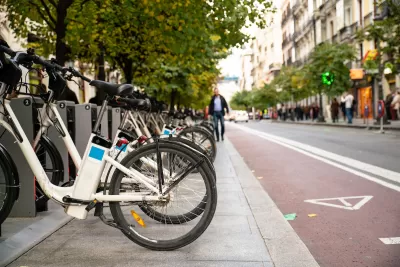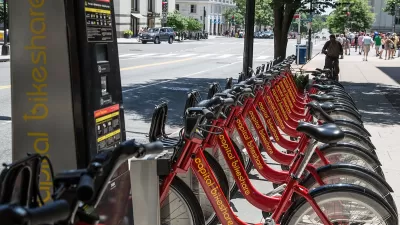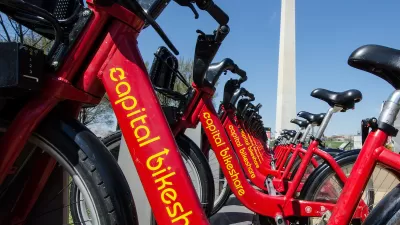Research reveals that shared bikes and scooters are often a crucial lifeline for low-income workers, signaling a need to include micromobility in the larger public transit conversation.

A study of survey data from the United States, Australia, and New Zealand sheds light on how low-income people use shared micromobility services, indicating an opportunity for cities to improve transportation services for the workers who need them most.
Kea Wilson outlines the findings in Streetsblog USA, writing, “Participants in the Lime Access program, which grants discounts of around ‘70 or 80 percent’ to riders who qualify, were significantly more likely to list essential reasons like ‘shopping’ for groceries (35 percent) and ‘commuting’ (31 percent) than non-Access riders, 11 and 21 percent of whom rode to complete errands or go to work, respectively.”
The study found that lower-income users were very unlikely to use shared mobility for non-essential reasons. “And a whopping 44 percent of their trips connected to a traditional transit ride, compared to just 23 percent of people who paid full price.”
As Wilson notes, “Perhaps the most surprising findings, though, were riders' qualitative responses about what micromobility meant to them, and how their lives were made better by having access to affordable ways to get around without a car.” According to Calvin Thigpen, director of policy research for Lime and co-author of the report, “People are using this to get around for pivotal trips; they are heavy, often daily users.”
However, most U.S. bike share systems are not subsidized by public funding, meaning any equity programs cut into the operators’ profit margins. Planetizen recently covered Houston BCycle’s decision to shut down that program due to funding problems. For Thigpen and other advocates, this signals a need to support and fund shared mobility programs as an integral component of an accessible, comprehensive public transit system.
FULL STORY: Study: How Low-Income People Really Use Micromobility

Alabama: Trump Terminates Settlements for Black Communities Harmed By Raw Sewage
Trump deemed the landmark civil rights agreement “illegal DEI and environmental justice policy.”

Study: Maui’s Plan to Convert Vacation Rentals to Long-Term Housing Could Cause Nearly $1 Billion Economic Loss
The plan would reduce visitor accommodation by 25% resulting in 1,900 jobs lost.

Planetizen Federal Action Tracker
A weekly monitor of how Trump’s orders and actions are impacting planners and planning in America.

Parklet Symposium Highlights the Success of Shared Spaces
Parklets got a boost during the Covid-19 pandemic, when the concept was translated to outdoor dining programs that offered restaurants a lifeline during the shutdown.

Federal Homelessness Agency Places Entire Staff on Leave
The U.S. Interagency Council on Homelessness is the only federal agency dedicated to preventing and ending homelessness.

Restoring Northern India’s Himalayan ‘Water Temples’
Thousands of centuries-old buildings protect the region’s natural springs and serve as community wells and gathering places.
Urban Design for Planners 1: Software Tools
This six-course series explores essential urban design concepts using open source software and equips planners with the tools they need to participate fully in the urban design process.
Planning for Universal Design
Learn the tools for implementing Universal Design in planning regulations.
Caltrans
Smith Gee Studio
Institute for Housing and Urban Development Studies (IHS)
City of Grandview
Harvard GSD Executive Education
Toledo-Lucas County Plan Commissions
Salt Lake City
NYU Wagner Graduate School of Public Service





























